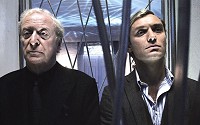
scr Harold Pinter
with Michael Caine, Jude Law
release US 12.Oct.07,
UK 23.Nov.07
07/US Paramount 1h26

Lift to the scaffold: Caine and Law



VENICE FILM FEST
TORONTO FILM FEST
 Based on the Anthony Shaffer play (rather than the 1972 film in which Caine played the opposite role), this two-man show is cleverly adapted by Pinter as a battle of wills, and directed by Branagh as a stylish, nasty tug of war. But it's also murky and overwrought.
Based on the Anthony Shaffer play (rather than the 1972 film in which Caine played the opposite role), this two-man show is cleverly adapted by Pinter as a battle of wills, and directed by Branagh as a stylish, nasty tug of war. But it's also murky and overwrought.
Milo Tindle (Law) is a struggling actor who one night visits wealthy crime novelist Andrew Wyke (Caine) in his isolated mansion. Tindle wants Wyke to divorce his wife so she can marry him. Wyke proposes that Tindle fake a burglary to get his hands on some expensive jewellery so he'll be able to support her (while Wyke claims the insurance money). It's clear that Wyke has been setting this up for some time, so Tindle is understandably nervous. And sure enough, it doesn't go as planned, leading to a fierce battle of wills between these two men.
Branagh directs this story on a strikingly modern set, as Wyke's manor house has been gutted and restructured with grey concrete, glass and steel minimalism. This, frankly, doesn't help the film feel less stagy. So Branagh shoots from skewed angles--straight overhead, through glass, around objects. This at least gives the film a striking visual style all its own, and embellishes the cat-and-mouse plot. Although it's more like a cat playing with a mouse than chasing one.
Meanwhile, Pinter's adaptation is made up of stilted dialog that lends itself to arch overacting, especially by Law. Caine is marginally more subdued, but every line feels weighed down with seething innuendo and barely concealed threats. The main problem is that neither of these men earn even a hint of sympathy; both are thoroughly slimy. We feel they deserve whatever they get, and we're pretty sure from the beginning that it's not going to end happily.
Patrick Doyle's moody music helps keep us watching, as does the central struggle for power and revenge, as we continually work to figure out who's ahead as the tables are turned again and again. But eventually the tide of overacting overcomes everything, drawing our attention to the plot's illogical, surreal nonsense and a couple of seriously dodgy scenes. It's an intriguing attempt at something different, not to mention the gimmicky casting, so it's a shame it doesn't really work.
 |
themes, language, violence | 28.Sep.07 |

 alex, nyc:
alex, nyc:  "The film is theatrical, one scene filmed from many angles. Fine: No fire-ball action, no skimpy-skirt women, no Eiffel towers or remote landscapes. No Hollywood endings either.
I don't understand why there would be a casting error, though. In fact, the acting performance is pretty stunning, even surprising, if at times over-the-top (but isn't that theater anyways?). Law and Caine steal the scene from each other and deliver a master class that we rarely see in the all-for-the-masses motion pictures of Fox and Co. More of this!" (30.Oct.07)
"The film is theatrical, one scene filmed from many angles. Fine: No fire-ball action, no skimpy-skirt women, no Eiffel towers or remote landscapes. No Hollywood endings either.
I don't understand why there would be a casting error, though. In fact, the acting performance is pretty stunning, even surprising, if at times over-the-top (but isn't that theater anyways?). Law and Caine steal the scene from each other and deliver a master class that we rarely see in the all-for-the-masses motion pictures of Fox and Co. More of this!" (30.Oct.07)
HOME | REVIEWS | NEWS | FESTIVAL | AWARDS | Q&A | ABOUT | TALKBACK